Brusthom Ziamani: Teenager guilty of plot to behead soldier
- Published
The BBC's June Kelly reports on the Ziamani's case
A teenager who was on his way to behead a British soldier with a 12in knife when he was arrested, has been found guilty of preparing a terrorist act.
Brusthom Ziamani, 19, was also carrying a hammer and an "Islamic flag" when he was arrested in London in August 2014.
The court heard he had been inspired by the murder of Fusilier Lee Rigby in 2013, researched Army cadet bases and boasted of a plot to "kill soldiers".
Ziamani, of Camberwell, London, will be sentenced on 20 March.
He was arrested in east London at about 16:30 BST on 19 August as part of a joint police and MI5 intelligence operation.
Earlier that day, police say he visited his former girlfriend, where he showed her the knife and hammer and told her he intended to attack and kill soldiers.
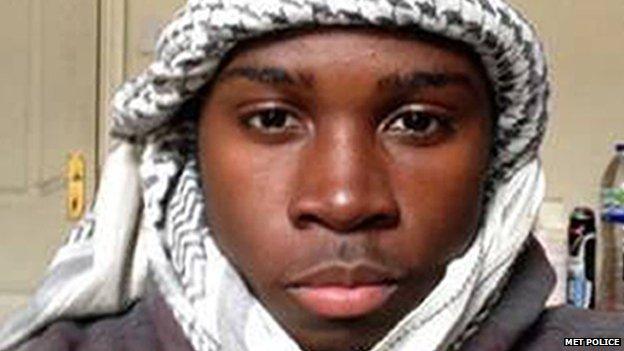
Commander Richard Walton, from the Metropolitan Police's counter-terrorism command, said the teenager's plot "starkly illustrates" one of the threats facing the UK.
"Ziamani was an impressionable young man who became radicalised then rapidly developed an extremist, violent mindset," he said.
"Over a series of months, he ultimately developed a desire to carry out a terrorist attack on British soldiers."
Mr Walton added that police had probably prevented a "horrific terrorist attack taking place on the streets of London".
Commander Richard Walton says Ziamani was radicalised over a matter of weeks
The jury at London's Old Bailey convicted Ziamani of preparing an act of terrorism on or before 20 August last year, after deliberating for more than a day.
Ziamani's barrister, Naeem Mian, told Judge Timothy Pontius that the teenager could expect the sentence to be one of "considerable length" but pointed to the fact that he was still "a young man who has no previous convictions at all".
The judge adjourned the case until next month to consider the sentence.
Ziamani, who was dressed in a grey and blue tracksuit, made no reaction to the verdict and sat impassively in the dock before being led away.

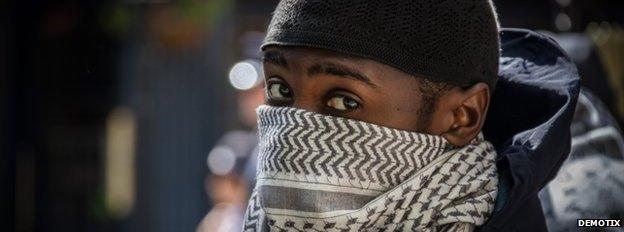
Analysis
By the BBC's Jon Brain, at the Old Bailey
I think the aspect of this case that many people will find particularly alarming is just how quickly this teenager was radicalised and to what extent.
It was only last April that he became a Muslim and yet four months later he was out on the streets armed and intending to kill someone in the name of his new religion.
Officers from Prevent - the counter-radicalisation programme - spoke to him on three separate occasions.
There was a real effort not to criminalise him but to help an obviously vulnerable teenager. But he just refused to engage with them.
One lesson is perhaps that no matter how fast you act, you may not be fast enough.
But one further point is that although he wasn't kept in custody, he was kept under surveillance and that surveillance led to his arrest on the day he set out with these weapons.
So you have to have this twin-track approach of persuasion and surveillance.

Sweet shop meetings
Ziamani converted to Islam in April 2014 and his extremist views "rapidly developed over a few months", the Met Police say.
During the trial, jurors heard how Ziamani had fallen in with members of al-Muhajiroun - an extremist organisation - after he was "kicked out" of home after converting to Islam.
Police say the group played a "major role in influencing and shaping his radical views".
He attended the group's talks in the basement of a halal sweet shop in Whitechapel, London, and bought a black flag to take on their demonstrations, saying "I'm going to rock it everywhere I go in the kaffirs' face".
He posted comments on Facebook saying that he was "willing to die in the cause of Allah" and saying: "Sharia law on its way on our streets.
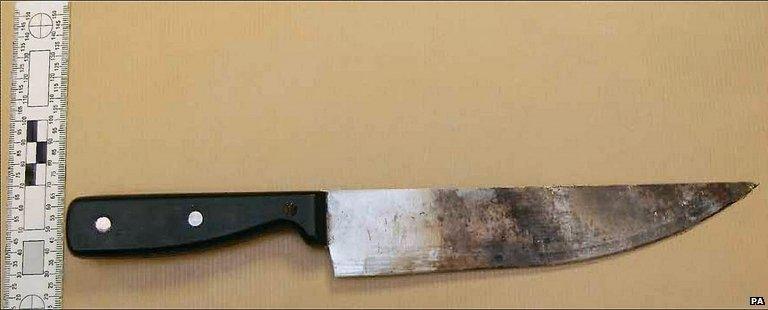
Ziamani was found carrying this 12in knife
"We will implement it, it's part of our religion."
The trial heard how Ziamani had described Michael Adebolajo - one of the men who murdered Fusilier Rigby in Woolwich, south-east London - as a "legend".
When Ziamani had been arrested in June last year on an unrelated matter, police found a ripped-up letter to his parents in his jeans pocket, in which he had written about mounting an attack on a British soldier.
He was then bailed, but refused to engage with officers from the government's anti-terrorism programme, Prevent.
'Felt threatened'
During the trial Ziamani denied he had been planning an attack similar to the murder of Fusilier Rigby.
He said his Facebook postings had been an attempt to "fit in" with the al-Muhajiroun group "because they were giving me places to stay and they did not like moderate Islam".
He also denied the hammer, knife and flag he had at the time of his arrest amounted to a terror "tool kit".
He said he had felt threatened after leaving a credit card theft scam.

Ziamani's letter to parents
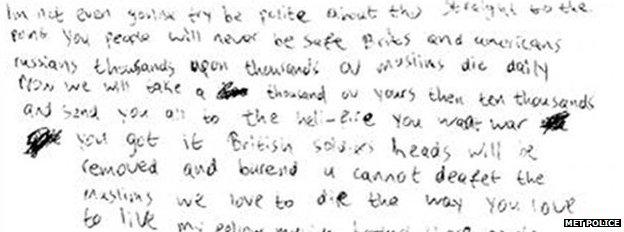
The letter found by police in Ziamani's trousers last June was addressed to "my beloved parents" and ended with Ziamani apologising for "the stress" he had caused in the past.
In the handwritten letter, scrawled over five sheets of paper, he wrote of his plan to "die a martyr" and gave his extreme view about the situation in the Middle East and the UK.
Ziamani said that as he had no means of getting to Syria or Iraq he planned to wage war against the British government, stating that "we should do a 9/11, 7/7 and a Woolwich all in one day".
He wrote that he wanted to give the British government a taste of its own medicine, saying they would be "humiliated" and talked of an "Islamic State of Ireland and Britain".
Ziamani quoted sections of the Koran, said he would "fight in the cause of Allah" and ended by telling his parents that becoming a Muslim had changed him tremendously "for the better".
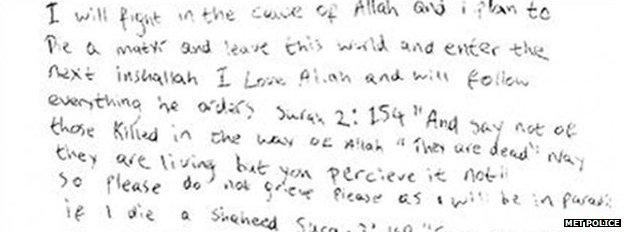

- Published19 February 2015
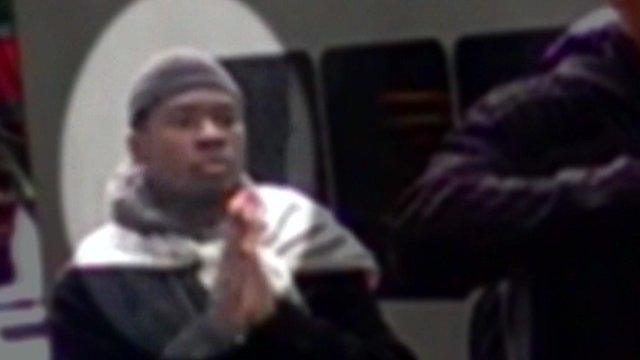
- Published19 February 2015
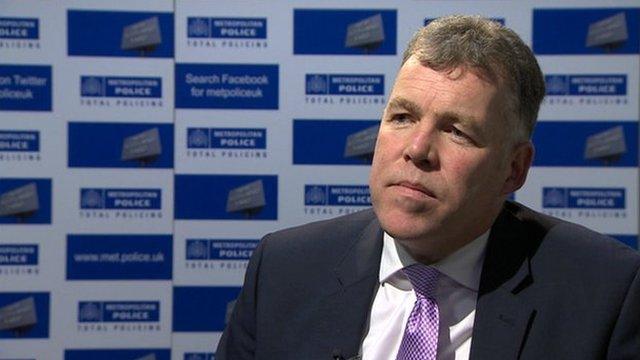
- Published12 February 2015
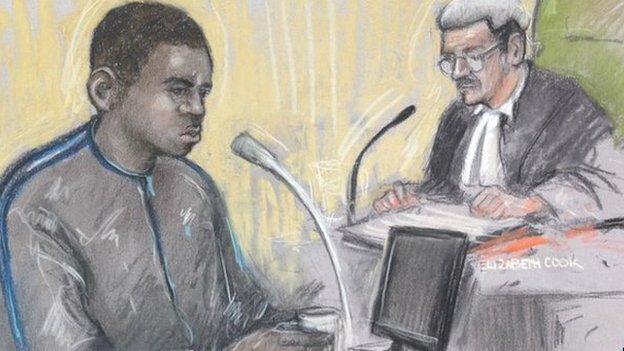
- Published9 February 2015
